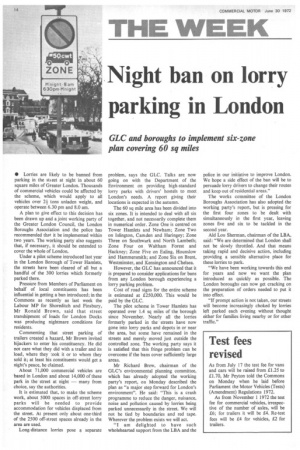Night ban on lorry parking in London
Page 16

If you've noticed an error in this article please click here to report it so we can fix it.
GLC and boroughs to implement six-zone plan covering 60 sq miles
• Lorries are likely to be banned from parking in the stieet at night in about 60 square miles of Greater London. Thousands of commercial vehicles could be affected by the scheme, which would apply to all vehicles over 21tons unladen weight, and operate between 6.30 pm and 8.0 am.
A plan to give effect to this decision has been drawn up and a joint working party of the Greater London Council, the London Boroughs Association and the police has recommended that it be implemented within two years. The working party also suggests that, if necessary, it should be extended to cover the whole of London.
Under a pilot scheme introduced last year in the London Borough of Tower Hamlets, the streets have been cleared of all but a handful of the 300 lorries which formerly parked there.
Pressure from Members of Parliament on behalf of local constituents has been influential in getting a ban introduced; in the Commons as recently as last week the Labour MP for Shoreditch and Finsbury, Mr Ronald Brown, said that street transhipment of loads for London Docks was producing nightmare conditions for residents.
Commenting that street parking of trailers created a hazard, Mr Brown invited hijackers to enter his constituency. He did not care what they did with a trailer and its load, where they took it or to whom they sold it; at least his constituents would get a night's peace, he claimed.
About 71,000 commercial vehicles are 'based in London and about 14,000 of these park in the street at night many from choice, say the authorities.
It is estimated that, to make the scheme work, about 5000 spaces in off-street lorry parks will be needed to provide accommodation for vehicles displaced from the street. At present only about one-third of the 2500 off-street spaces already in the area are used.
Long-distance lorries pose a separate problem, says the GLC. Talks are now going on with the Department of the Environment on providing high-standard lorry parks with drivers' hostels to meet . London's needs. A report giving their locations is expected in the autumn.
The 60 sq mile area has been divided into six zones. It is intended to deal with all six together, and not necessarily complete them in numerical order. Zone One is centred on Tower Hamlets and Newham; Zone Two on Islington, Camden and Haringey; Zone Three on Southwark and North Lambeth; Zone Four on Waltham Forest and Hackney; Zone Five on Ealing, Hounslow and Hammersmith; and Zone Six on Brent, Westminster, and Kensington and Chelsea.
However, the GLC has announced that it is prepared to consider applications for bans from any London borough experiencing a lorry parking problem.
Cost of road signs for the entire scheme is estimated at £250,000. This would be paid by the GLC.
The pilot scheme in Tower Hamlets has operated over 1.4 sq miles of the borough since November. Nearly all the lorries formerly parked in the streets have now gone into lorry parks and depots in or near the area, but some have remained in the streets and merely moved just outside the controlled zone. The working party says it is satisfied that this fringe problem can be overcome if the bans cover sufficiently large areas.
Mr Richard Brew, chairman of the GLC 's environmental planning committee, which has already adopted the working party's report, on Monday described the plan as "a major step forward for London's environment". He said: "This is a crash programme to reduce the danger, nuisance, noise and pollution caused by lorries being parked unnecessarily in the street. We will not be tied by boundaries and red tape. Wherever the problem exists we will act.
"I am delighted to have such wholehearted support from the LBA and the police in our initiative to improve London. We hope a side effect of the ban will be to persuade lorry drivers to change their routes and keep out of residential areas."
The works committee of the London Boroughs Association has also adopted the working party's report, but is pressing for the first four zones to be dealt with simultaneously in the first year, leaving zones five and six to be tackled in the second year.
Ald Lou Sherman, chairman of the LBA, said: "We are determined that London shall not be slowly throttled. And that means taking rapid and decisive action, including providing a sensible alternative place for these lorries to park.
"We have been working towards this end for years and now we want the plan introduced as quickly as possible. The London boroughs can now get cracking on the preparation of orders needed to put it into effect.
"If prompt action is not taken, our streets will become increasingly choked by lorries left parked each evening without thought either for families living nearby or for other traffic."




























































































